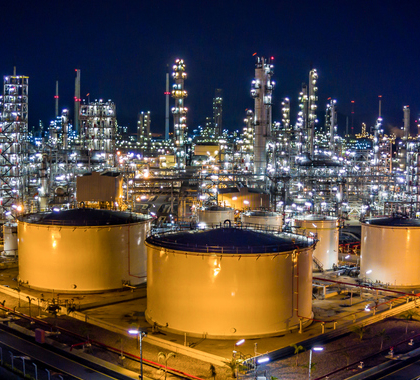A North Dakota judge rejected a challenge to a state permit issued to Meridian Energy Group in June 2018 to begin construction of what would be the first new industrial crude oil refinery in the United States in nearly 40 years, the $800 million Davis refinery in Billings County, North Dakota.
District Judge Dann E. Greenwood’s decision upholding the North Dakota Department of Health’s air quality permit will allow work to resume on the refinery in the spring when the winter weather is over.
Located Near National Park
The National Parks Conservation Association, the Environmental Law and Policy Center, and the Dakota Resource Council had sued to block construction of the refinery, which is located about three miles east of Theodore Roosevelt National Park, North Dakota’s most popular tourist destination.
The plaintiffs argued the Health Department had underestimated the quantities of harmful pollutants the refinery would generate and pollution from the facility would mar the park’s scenery and erode air quality for wildlife and park visitors.
Judge Rules Permit Justified
Greenwood ruled the state Health Department had effectively supported its position that the Davis refinery will not be a major source of pollution in the park. The agency issued the permit only after conducting a two-year analysis that involved more than 1,000 hours of department staff time and review of more than 10,000 public comments, the judge noted.
“[The agency’s] expertise is entitled to deference when, as here, the subject matter is complex,” Greenwood wrote in his January 24 ruling.
Even with this permit, the refinery will have to prove it can meet state and federal air quality standards in order to get an operating permit, a separate process and permit, and compliance with those standards will be continually monitored, the Health Department noted.
Refining for Local Use
The Davis refinery will be located on about 150 acres, including a buffer zone, east of the Fryburg Rail Facility in Belfield, North Dakota, in the heart of the oil-rich Bakken shale formation. With a rated capacity of 49,000 barrels per day (bpd), the refinery could produce up to 800 million gallons a year of refined products from local crude to serve regional markets.
Currently, the Bakken yields more than 1.2 million bpd of oil, more than 95 percent of which is shipped at comparatively great expense to refineries hundreds of miles away. The Davis Refinery will add to the current 94,000 bpd of refining capacity within the state.
Because it will use locally extracted natural gas to operate, the refinery will save Meridian money and reduce the amount of natural gas vented or flared in Bakken fields with limited storage and pipeline capacity, which will help the area meet federal and state air quality standards.
‘A Win for All’
The Davis Refinery presents a win-win-win for North Dakotans in general and Bakken oil producers in particular, says former North Dakota state representative Bette Grande, now a research fellow at The Heartland Institute, which publishes Environment & Climate News.
“The Davis Refinery is a win for all,” Grande said. “Because this refinery will utilize local natural gas to operate, oil producers will be able to move forward with their oil drilling programs without limitations caused by North Dakota’s gas capture requirements, and it will reduce the amount of oil currently being transported out of state by pipelines and rail for refining elsewhere.
“Much of the infrastructure to deliver the crude stock and natural gas to the refinery is already in place,” Grande said. “In addition, the water source for the Davis Refinery is a brine formation 5,000 feet underground. This salty water is not suitable for drinking, farming, or ranching, meaning its use by the refinery will not impact water availability in the area.”
Cites Need for Fossil Fuels
The United States should not put itself at a disadvantage versus our economic competitors by unnecessarily hampering oil and gas production, says North Dakota state Sen. Curt Kreun (R-Grand Forks).
“With so many products requiring refined petroleum byproducts, including clothing, glass, and steel manufacturing, just to name a few, we cannot cut off our nose to spite our face by unilaterally quitting the use of fossil fuels,” Kreun said. “Worldwide, U.S. oil and gas consumption remains a small pinpoint in the growing use of fossil fuels for energy.
“North Dakotans, facing winters where the temperature gets down to 20 below zero, do not want to go the way of California, with its rolling brownouts and blackouts,” Kreun said. “California energy providers actually warn customers that if they need constant electric power, like anyone on a ventilator, for example, they should acquire their own backup generator. This is not acceptable in North Dakota.”
Challenges Remain
Despite Greenwood’s ruling, construction and operation of the Davis Refinery could still be delayed.
Two of the parties to the air quality permit lawsuit are challenging a separate decision by other North Dakota regulators not to review whether the refinery site is appropriate. And although a state administrative law judge recommended the government issue a permit allowing the refinery to draw water from an underground aquifer for its operations, several environmental groups have indicated they will sue to overturn such a permit if state regulators grant it.
Duggan Flanakin ([email protected]) writes from Austin, Texas.
Official Connections
State Sen. Curt Kreun (R-Grand Forks): https://www.legis.nd.gov/assembly/65-2017/members/senate/senator-curt-kreun; [email protected]




